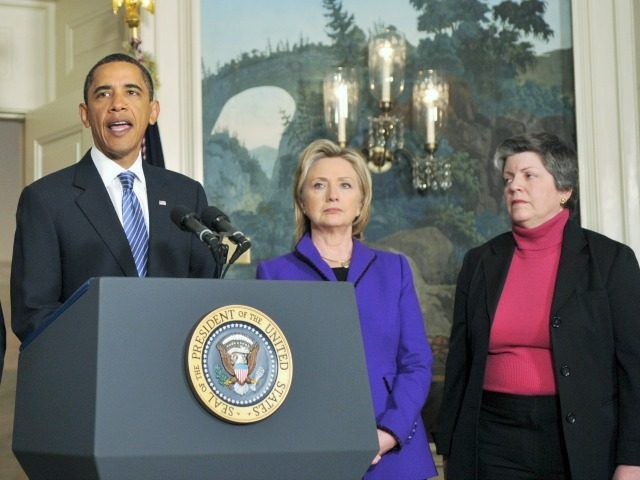A lead homeland security advisor on President Barack Obama’s 2008 transition team resigned in disgust after being routinely ignored by the incoming White House team, an email buried in the thousands released by the organization Wikileaks this week reveals.
The 2008 email chain reveals that policy adviser Stephen Flynn tendered his resignation via email to then-future National Security Adviser Susan Rice, and intended to send his letter to John Podesta, current Hillary Clinton campaign chairman, but did not have his email address. Rice, Podesta, and future Deputy Secretary of State James Steinberg appear concerned in the email chain that Flynn may express his displeasure publicly.
Rice forwards the email, which begins with Flynn condemning the Obama transition team for disregarding the importance of homeland security, and particularly the importance of picking up the pieces in a Department of Homeland Security Flynn found to be in shambles.
“I intend to resign from the DHS Transition Team,” Flynn wrote on November 2, 2008, according to the Wikileaks files. “I see this as my last recourse in sounding this alarm: the Obama transition process has not assigned sufficient priority to: (1) the deeply troubled state of the Department of Homeland Security, and (2) the exposure that presents to the incoming Administration and the nation.”
Flynn implicitly condemns the Bush administration for the state of affairs at the agency. “I cannot overstate how badly broken the Department of Homeland Security is,” he writes:
DHS has managed to frustrate or alienate every constituency that is essential to its mission: state and local homeland security officials, police, and emergency responders; industry working groups from all the critical infrastructure sectors; the other federal departments and agencies with overlapping jurisdiction; foreign counterparts in Canada, Mexico, and EU; and the myriad Congressional members and committee & subcommittee staffs that have oversight responsibilities.
Flynn speculates that the Obama transition team is ignoring him – and accuses Podesta specifically of ignoring his request to meet – because the Obama campaign did not rely on homeland security issues to win votes: “working within the Obama transition process over the last several weeks, I have been unsuccessful in communicating the extent to which the policy and organizational issues associated with homeland security have fallen through the cracks.”
“The homeland security issue never came up during the general election so the public is largely oblivious to the fact that the new Administration will be inheriting a flawed homeland security strategy,” he continues. He goes on to argue that he believes he is personally pivotal to the reconstruction of the agency because “neither the department nor the homeland security mission was around in the Clinton administration,” so few Democrats have the expertise to run it.
“Apparently my reputation as a leading expert and practitioner on this issue carries too little weight for the transition team leaders to take my concerns seriously and for them to recognize the leadership I could provide to help put things on track,” he concludes.
In forwarding Flynn’s resignation over, Rice writes: “Obviously, this raises a range of concerns about Steve and the possibility this will leak, among others. Jim will ensure we first have all the backstory and then be in touch with Steve. I will follow up as necessary.”
Steinberg replies to Rice implying that he calmed Flynn down, perhaps convicing him to keep the disagreements private. “Soothed for now. Spoke to him tonight. Can provide details as needed,” he wrote.
Flynn had long been critical of the Bush administration after working within Clinton’s National Security Council staff. He is the author of the 2005 book America the Vulnerable, in which he argues Bush administration policy has failed to keep America safe. In a March 2008 Council on Foreign Relations interview, Flynn explained that terrorism is not merely a military challenge, but a social one:
“What’s crazy, frankly, about how we’ve approached 9/11 is that we essentially say, ‘Americans shop and travel go about your lives and we’ll just empower our spies and our warriors and our policemen, we’re going to take care of this problem for you,’” Flynn says. “The current and future battle space with our adversaries is going to be in the civil, economic space, and there we need to draw on the great strength of America, which is our civil society.”
Flynn is currently a professor at Northeastern University. His faculty biography reads, “In 2008 he served as the lead homeland security policy adviser for the Presidential Transition Team for President Barack Obama.”

COMMENTS
Please let us know if you're having issues with commenting.